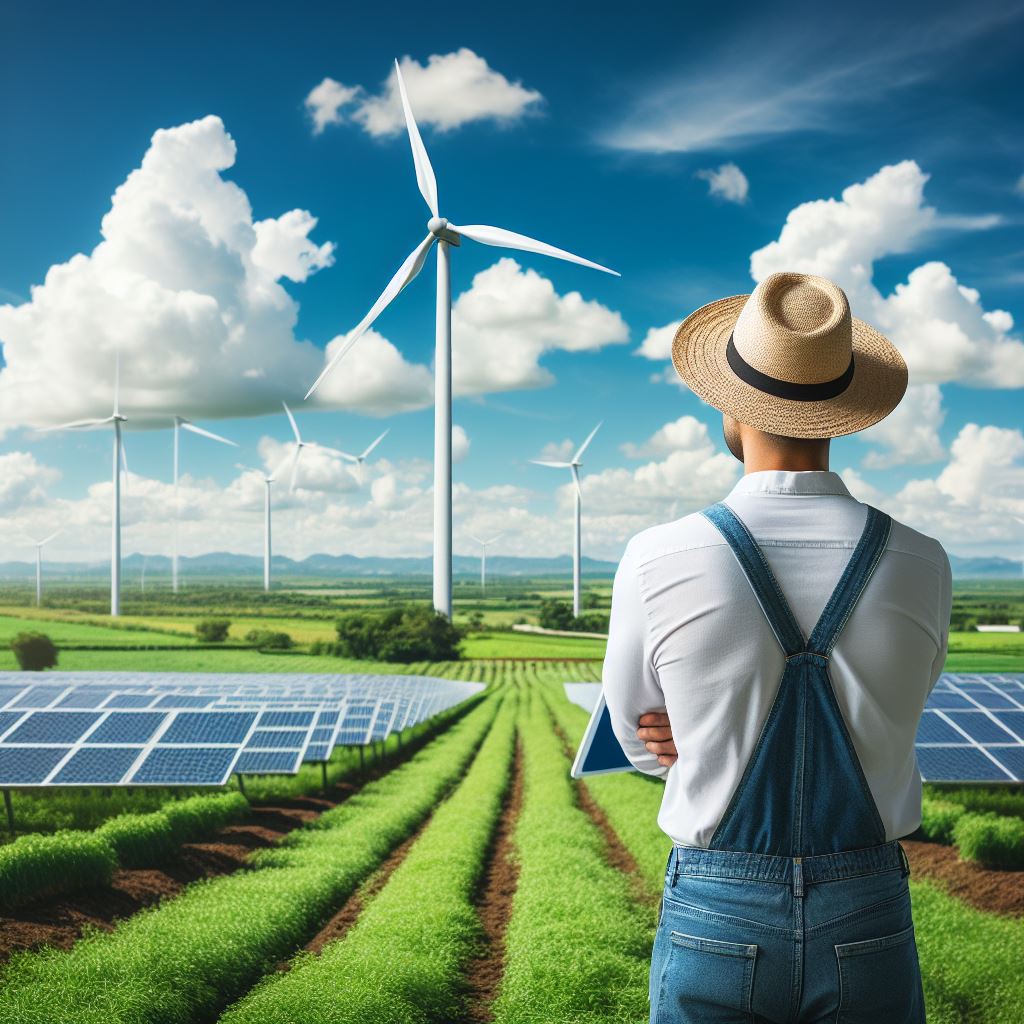Introduction
Sustainable farming is crucial for the health of our planet and future generations.
It ensures the availability of resources for long-term agricultural production.
Solar panels offer a sustainable solution by harnessing the sun’s energy to power farming operations.
Solar energy is clean, renewable, and abundant, making it an ideal alternative to traditional energy sources.
They are designed to convert sunlight into electrical energy through the photovoltaic effect.
They consist of multiple solar cells made of semiconductor materials such as silicon.
When sunlight hits these cells, the photons transfer their energy to electrons, creating an electric current.
This electricity can then be used to power various farming activities, such as irrigation systems, lighting, and machinery.
Using solar panels in farming not only reduces greenhouse gas emissions but also lowers energy costs.
Farmers can save money by generating their own electricity instead of relying solely on the grid.
Additionally, solar panels require minimal maintenance and have a long lifespan, making them a cost-effective investment in the long run.
Solar-powered farming also allows for greater energy independence and resilience.
In remote or rural areas, where access to electricity is limited, solar panels can provide a reliable source of power.
Farmers can overcome the challenges of unreliable electricity supply and continue their operations uninterrupted.
Furthermore, solar panels can be integrated into existing farming practices without causing significant disruption.
Transform Your Agribusiness
Unlock your farm's potential with expert advice tailored to your needs. Get actionable steps that drive real results.
Get StartedThey can be installed on rooftops, barns, or open fields, depending on the available space and sun exposure.
Additionally, solar panels are modular, meaning they can be easily expanded or relocated as needed.
In short, sustainable farming with solar panels offers numerous benefits. It promotes environmental preservation, reduces costs, and enhances energy independence.
By harnessing the sun’s energy, farmers can contribute to a greener and more sustainable future.
Benefits of using solar panels in farming
Sustainable farming with solar panels offers numerous benefits that can transform the agricultural industry.
By harnessing the power of the sun, farmers can reduce their carbon footprint, lower their energy costs, and improve energy efficiency.
Let’s take a closer look at these advantages:
Reduced Carbon Footprint
Solar panels generate electricity by converting sunlight into energy, producing zero greenhouse gas emissions.
This clean energy source significantly reduces the carbon footprint of farming operations.
By adopting solar panels, farmers can contribute to a healthier planet.
Lower Energy Costs
Traditional farming methods heavily rely on fossil fuels, which come with substantial costs.
Solar panels provide an alternative source of energy that is free and infinite.
By utilizing the sun’s power, farmers can lower their electricity bills and enhance their financial stability.
Improved Energy Efficiency
With solar panels, farmers can optimize their energy consumption through efficient energy management systems.
Transform Your Agribusiness Online Presence
Stand out with compelling content tailored to engage your audience and drive results. From blog posts to social media, we’ll create what your business needs to grow.
Get StartedThese systems convert the excess energy generated during daylight hours into stored energy, which can be used during periods of low or no sunlight.
This feature ensures a more consistent and efficient energy supply for farm operations.
Increased Energy Independence
Solar panels grant farmers more autonomy over their energy supply.
They no longer have to rely solely on the grid, which can be prone to outages or price fluctuations.
By generating their own electricity, farmers gain greater control and stability in their energy needs, resulting in increased productivity and profitability.
Long-Term Cost Savings
Although the initial investment in solar panels may seem high, they offer long-term cost savings.
Once installed, solar panels require minimal maintenance and have a lifespan of 25 to 30 years.
This longevity ensures a steady and affordable source of energy for farmers, reducing their reliance on external energy sources.
Diversification of Income
Farmers can take advantage of government incentives and programs promoting renewable energy.
Through net metering or feed-in-tariffs, excess electricity generated by their solar panels can be sold back to the grid, creating an additional revenue stream for farmers.
This diversification helps mitigate potential income risks associated with traditional farming practices.
Environmental Stewardship
By adopting solar panels, farmers demonstrate their commitment to environmental stewardship.
Sustainable farming practices are increasingly important as the world faces climate change and diminishing natural resources.
Solar panels contribute to a greener and more sustainable agricultural sector, preserving the land and ecosystem for future generations.
Unlock Farming Insights for Growth
Make smarter farming decisions with detailed reports on market trends, weather patterns, and soil health tailored to your farm's success. Boost productivity with actionable data.
Get ReportPositive Brand Image
Consumers are actively seeking environmentally responsible products and brands.
Implementing solar panels in farming can give farmers a competitive advantage in the marketplace.
By showcasing their commitment to sustainability, farmers can attract environmentally conscious consumers and build a positive brand image.
In fact, sustainable farming with solar panels offers numerous benefits to farmers and the environment.
By reducing carbon footprints, lowering energy costs, improving energy efficiency, and diversifying income, farmers can embrace a greener, more economically stable, and socially responsible approach to agriculture.
The adoption of solar panels not only supports the sustainable farming movement but also sets the stage for a brighter future in the agricultural industry.
Read: Farms Go Green: Wind Energy’s Role
Types of solar panels suitable for farming
As the demand for sustainable farming practices grows, the use of solar panels becomes increasingly popular.
Solar panels can provide farmers with a clean and renewable source of energy, reducing their reliance on traditional power sources and cutting down on greenhouse gas emissions.
There are two main types of solar panels suitable for farming: photovoltaic (PV) panels and concentrated solar power (CSP) systems.
Photovoltaic (PV) solar panels
PV panels are the most commonly used type of solar panel in the agricultural industry.
These panels work by converting sunlight into electricity using a semiconductor material.
PV panels are lightweight, easy to install, and can be mounted on the roofs of farm buildings, on pole-mounted racks, or even on the ground.
They require little maintenance and have a long lifespan, making them a cost-effective option for farmers.
Concentrated solar power (CSP) systems
CSP systems use mirrors or lenses to concentrate sunlight onto a receiver, which in turn heats a fluid to generate steam.
This steam then powers a turbine to produce electricity. While CSP systems are less common in farming applications, they have the advantage of being able to store thermal energy, allowing for electricity generation even when the sun is not shining.
This feature can be especially useful for farms that require a constant and reliable power source.
Now that we have looked at the types of solar panels suitable for farming, let’s delve into their benefits and applications.
Benefits of solar panels in farming
- Reduced energy costs: By harnessing the power of the sun, farmers can significantly reduce their energy costs. Solar panels provide a consistent and clean source of energy that is not subject to price fluctuations.
- Environmental sustainability: Solar panels produce electricity without emitting harmful greenhouse gases into the atmosphere. By embracing solar power, farmers can contribute to a healthier environment and combat climate change.
- Energy independence: Solar panels grant farmers the ability to generate their own electricity, reducing their reliance on the electrical grid. This independence provides stability and resilience, especially in remote agricultural areas.
Applications of solar panels in farming
- Irrigation systems: Solar panels can power water pumps used for irrigation, allowing farmers to efficiently water their crops while reducing the strain on traditional power grids.
- Livestock operations: Solar panels can provide electricity to power ventilation systems, lighting, and even water pumps for livestock operations. This helps improve animal welfare and reduces dependence on fossil fuel-based energy sources.
- On-site power generation: Solar panels can be installed directly on farm buildings to generate electricity for farm operations, such as running machinery, powering storage facilities, or charging electric vehicles.
- Renewable energy income: Farmers can generate additional income by selling excess electricity generated by their solar panels back to the grid. This can offset the initial investment cost and create a new revenue stream.
In essence, solar panels offer a sustainable and efficient energy solution for farmers.
With the ability to reduce energy costs, contribute to environmental sustainability, and provide energy independence, solar panels are becoming an increasingly attractive option for the agriculture industry.
Whether it’s using photovoltaic panels for easy installation and long-term reliability or employing concentrated solar power systems for energy storage, the benefits and applications of solar panels in farming are plentiful.
By embracing solar power, farmers can not only enhance their operations but also contribute to a greener and more sustainable future.
Read: Biomass in Agriculture: A New Dawn
Integration of solar panels in farming operations
Sustainable farming practices have become a priority in recent years, and one area that has gained significant attention is the integration of solar panels in farming operations.
Solar panels provide a clean and renewable source of energy that can be utilized in a variety of ways on the farm.
Here are some examples of how solar panels can be used in sustainable farming:
Powering Irrigation Systems
One of the most significant energy requirements on a farm is for irrigation systems.
Traditional irrigation methods rely on fossil fuels, which are not only expensive but also harmful to the environment.
By installing solar panels, farmers can power their irrigation systems with clean energy, reducing their reliance on fossil fuels and lowering their carbon footprint.
Solar-Powered Agribusinesses
Solar panels can also be used to power various agribusiness operations.
From the processing of agricultural products to the operation of machinery and equipment, solar energy can replace traditional sources of power, such as diesel generators.
This shift not only reduces costs but also minimizes the environmental impact, contributing to a more sustainable farming model.
Solar Energy for Livestock Farming
Livestock farming requires significant amounts of energy for various tasks, including heating, cooling, and lighting.
Solar panels can be utilized to harness solar energy, providing a reliable and sustainable source of power for these needs.
Additionally, solar energy can be used to power electric fences and water pumps, making livestock farming more efficient and eco-friendly.
Reduced Dependence on the Grid
By incorporating solar panels into their farming operations, farmers can reduce their dependence on the traditional electric grid.
This energy independence offers numerous benefits, including stable electricity prices, a backup power source during outages, and the ability to sell excess energy back to the grid, generating additional income.
Environmental Benefits
Aside from the economic advantages, the integration of solar panels in farming brings significant environmental benefits.
Solar energy is clean and renewable, emitting zero greenhouse gases during operation.
By relying on solar power, farmers can help mitigate climate change and reduce their environmental impact, contributing to a more sustainable future for agriculture.
Long-Term Cost Savings
While the initial investment in solar panels may seem significant, their long-term cost savings cannot be overlooked.
Solar energy is essentially free once the panels are installed, allowing farmers to save on electricity bills over time.
In many cases, the energy savings are significant enough to warrant a return on investment within a few years.
Government Incentives
Governments around the world recognize the importance of renewable energy, including solar power, in achieving sustainable development.
Therefore, many offer attractive incentives and subsidies to farmers who adopt solar panels.
These incentives can significantly reduce the initial investment and make solar energy an even more appealing option for farmers.
In general, the integration of solar panels in farming operations is a smart and sustainable approach to agriculture.
With their ability to power irrigation systems, agribusinesses, and livestock farming, solar panels offer numerous benefits, including reduced dependence on the grid, environmental advantages, long-term cost savings, and government incentives.
By harnessing the power of the sun, farmers can contribute to a more sustainable future while also reaping economic rewards.
Read: Wind Energy: Revolutionizing Farming
Government Initiatives and Policies Supporting Solar-Powered Farming
Solar-powered farming is a sustainable and innovative approach to agricultural practices.
With the help of solar panels, farmers can harness the power of the sun to generate clean and renewable energy for their farming operations.
Governments around the world have recognized the environmental and economic benefits of this practice and have implemented supportive initiatives and policies.
These initiatives aim to encourage the adoption of solar energy in farming and provide incentives for farmers to transition to this renewable source of power.
Incentive Programs and Grants
One of the key ways governments support solar-powered farming is through incentive programs and grants.
These programs offer financial incentives and support to farmers who install solar panels on their farms.
The incentives can include tax credits, rebates, or direct funding for the purchase and installation of solar infrastructure.
These programs are designed to offset the initial costs of installing solar panels, making it more affordable for farmers to embrace solar energy.
By reducing the financial burden, governments hope to encourage widespread adoption of solar panels in agriculture and promote sustainable farming practices.
Renewable Energy Policies and Regulations
In addition to incentive programs, governments have also implemented renewable energy policies and regulations to support solar-powered farming.
These policies set targets for renewable energy consumption and specify the conditions and requirements for solar energy systems in agriculture.
For example, some governments have introduced net metering policies, allowing farmers to sell excess solar energy back to the grid.
This not only incentivizes farmers to produce more solar energy but also contributes to the overall renewable energy capacity of the region.
Moreover, governments have streamlined the regulatory processes for obtaining permits and licenses for solar installations in agricultural settings.
These streamlined procedures facilitate the integration of solar panels into farms and encourage farmers to embrace this sustainable technology.
Federal and state governments have also collaborated with research institutions and industry associations to develop best practices and guidelines for solar-powered farming.
These guidelines ensure that solar installations are efficient, safe, and optimized for agricultural operations.
By providing farmers with the necessary information and expertise, governments further facilitate the adoption of solar energy in farming.
International Cooperation and Collaborations
Furthermore, governments have recognized the significance of international cooperation in promoting solar-powered farming.
Many countries are actively involved in global initiatives, such as the International Solar Alliance, to collectively address climate change and promote the use of solar energy in various sectors, including agriculture.
Through these collaborations, governments can share experiences, knowledge, and technologies related to solar-powered farming.
This helps in creating a supportive global environment and encourages the exchange of best practices and innovative solutions.
In brief, governments play a pivotal role in supporting solar-powered farming through various initiatives and policies.
These include incentive programs and grants, renewable energy policies and regulations, as well as international cooperation and collaborations.
By actively promoting the adoption of solar energy in agriculture, governments can contribute to sustainable farming practices, reduce greenhouse gas emissions, and ensure a greener future for generations to come.
Read: Solar Power Boosts Farms: A Bright Future

Case studies and Success Stories of solar-powered farms
Solar-powered farms are an innovative solution that combines sustainable farming practices with renewable energy sources.
Many case studies and success stories demonstrate the effectiveness of solar panels in farming operations.
Examples of farms using solar panels
For example, the Woodland Farm in Vermont has been using solar panels to power its operations since 2008.
Their solar array provides not only electricity but also heating for their greenhouses, making their business more efficient.
Another successful case is the Arden Farm in Oregon, which has reduced its reliance on fossil fuels by installing solar panels.
These farms’ experiences show the potential for solar-powered farms to revolutionize the agricultural industry.
Positive impact on the environment and economy
The use of solar panels in farming has several positive impacts on the environment and economy.
Firstly, solar power significantly reduces greenhouse gas emissions compared to traditional farming practices.
The renewable energy generated by the solar panels replaces the need for fossil fuels, which are major contributors to climate change.
This reduction in emissions helps to combat global warming and protect the planet for future generations.
Additionally, solar-powered farms can save farmers money by reducing their energy costs.
By harnessing the sun’s energy, farmers can decrease their reliance on expensive utility bills.
This cost-saving aspect translates into more sustainable farming practices and increased profitability for farmers.
Moreover, solar panels can enhance the resiliency of farms by providing a consistent and reliable energy source.
With solar power, farmers are less vulnerable to power outages and fluctuating electricity prices.
This energy independence allows them to focus on their agricultural operations without worrying about energy supply interruptions.
Aside from case studies, numerous farms worldwide are adopting solar panels to enhance their sustainability efforts.
For instance, Riverbend Gardens in Alberta, Canada, operates a solar-powered irrigation system that efficiently waters their crops.
The use of solar panels not only reduces their reliance on grid electricity but also minimizes water waste.
Another example is Loutet Farm in British Columbia, which employs solar energy to power their farm stand and other facilities.
These farms demonstrate that solar panels can be integrated into various aspects of farming to yield multiple benefits.
Solar-powered farms not only contribute to environmental protection but also stimulate the economy.
The sustainability practices adopted by solar-powered farms align with the increasing consumer demand for organic and locally produced food.
Consumers are willing to pay a premium for products that are not harmful to the environment.
This creates opportunities for farmers to market their sustainable practices and attract a larger customer base.
Moreover, the installation and maintenance of solar panels create jobs and stimulate economic growth.
The solar industry is rapidly expanding, providing employment opportunities for individuals with expertise in solar installation and maintenance.
As more farms adopt solar panels, the demand for these services will continue to grow, providing job security for many.
In review, solar-powered farms have proven to be a successful and sustainable solution for modern agriculture.
Case studies and success stories highlight their effectiveness and the positive impact they have on the environment and economy.
By harnessing the power of the sun, solar panels enable farms to reduce emissions, save money, and enhance resilience.
Furthermore, solar-powered farms align with consumer demand for sustainable and locally produced food, driving economic growth.
As the agricultural sector seeks to find more sustainable practices, solar panels offer a viable and innovative solution.
Challenges and Considerations in Adopting Solar Panels for Farming
Listed below are key challenges and considerations farmers need to address when adopting solar panels for their farms:
Initial Investment Costs
- Installing solar panels requires a significant upfront investment.
- Farmers must consider the cost of purchasing and installing solar panels.
- Financing options such as loans or grants can help offset the initial investment costs.
Maintenance and Upkeep
- Solar panels require regular maintenance and cleaning to ensure optimal performance.
- Farmers should allocate resources for regular inspections and repairs.
- Weather conditions, such as hailstorms or heavy snowfall, may cause damage and require immediate attention.
Compatibility with Existing Infrastructure
- Integration of solar panels with existing farm infrastructure can pose challenges.
- Farmers need to assess the compatibility of solar panels with irrigation systems, barns, and storage facilities.
- Structural modifications or upgrades may be required to accommodate the installation of solar panels.
Despite these challenges, there are several reasons why farmers should consider adopting solar panels for their farms:
Energy Cost Savings
- Solar panels provide a renewable energy source that can significantly reduce electricity bills for farming operations.
- By harnessing solar power, farmers can reduce their reliance on traditional energy sources.
- Over time, the savings on energy costs can offset the initial investment in solar panels.
Environmental Benefits
- Solar panels generate clean and renewable energy, contributing to a reduction in greenhouse gas emissions.
- By adopting solar energy, farmers can minimize their carbon footprint and promote sustainable farming practices.
- Using solar energy helps contribute to a cleaner and healthier environment for future generations.
Long-Term Reliability
- Solar panels have a long lifespan, often lasting for 25-30 years, ensuring a reliable source of energy.
- Farmers can benefit from stable and predictable energy production for an extended period.
- Investing in solar panels guarantees a long-term energy solution to support farming operations.
In a nutshell, while adopting solar panels for farming comes with challenges and considerations, the long-term benefits outweigh the initial obstacles.
With careful planning, farmers can secure a sustainable and cost-effective energy solution that aligns with environmental goals.
The investment in solar panels not only brings financial savings but also contributes to a greener and more sustainable future for agriculture.
Tips for farmers interested in implementing solar panels
As the demand for sustainable farming practices continues to rise, many farmers are turning to solar panels as an environmentally friendly and cost-effective solution.
Implementing solar panels on your farm can not only reduce your carbon footprint but also lower your energy bills in the long run.
If you’re considering incorporating solar panels into your farming operation, here are some tips to help you get started:
Conduct a solar assessment
Before investing in solar panels, it’s essential to evaluate your farm’s solar potential.
Conduct a thorough assessment to determine the feasibility and suitable locations for solar installations.
Consider factors such as shading, orientation, and available space for optimal solar energy production.
Seek professional advice
Consulting with industry professionals, such as solar energy experts and agricultural engineers, can provide valuable insights and guidance.
They can help you understand the technical aspects, recommend suitable equipment, and assess the financial viability of your solar project.
Research available financing options
While solar panel installations can have substantial upfront costs, various financing options can help make the investment more affordable.
Research and explore options such as government grants, loans, tax incentives, and leasing agreements.
Evaluate each option’s terms and conditions to choose the most beneficial one for your farm.
Evaluate energy consumption and needs
Understanding your farm’s energy consumption patterns is crucial when sizing your solar panel system.
Analyze your historical energy bills and calculate your average electricity usage.
This information will help determine the appropriate system size to meet your farm’s energy needs, ensuring optimal efficiency.
Choose the right solar panel system
There are various types of solar panel systems available, such as grid-tied, off-grid, and hybrid systems.
Each has its advantages and considerations based on your farm’s location, energy requirements, and budget.
Consider consulting with experts to select the most suitable system for your specific needs.
Collaborate with utility companies
Engaging with your local utility companies can be beneficial when implementing solar panels.
Discover if they offer net metering programs, which allow you to sell excess solar energy back to the grid.
Net metering can help offset your energy costs further and potentially generate an additional revenue stream.
Maintain and monitor your solar panel system
To ensure your solar panels continue to operate efficiently, regular maintenance and monitoring are crucial.
Develop a maintenance plan that includes routine cleaning, inspection of equipment, and tracking energy production.
Monitoring your system’s performance will help identify and address any issues promptly.
Educate yourself and your staff
Keeping up with the latest advancements and best practices in solar technology is essential.
Educate yourself and your farm staff about solar energy and how to optimize its usage.
This knowledge will enable you to make informed decisions and implement strategies that maximize the benefits of your solar panel system.
Plan for future expansion
As your farm grows, so might your energy needs. When designing your solar panel system, consider scalability and potential future expansion.
Plan ahead to ensure your system can accommodate increased energy demands without requiring significant modifications or investments.
Share your success story
Once you have successfully implemented solar panels on your farm, share your experience and success with others.
By sharing your journey, challenges, and outcomes, you can inspire and encourage fellow farmers to embrace sustainable farming practices and explore solar energy solutions.
Implementing solar panels on your farm can be a transformative step towards sustainability and financial savings.
By following these tips and seeking professional guidance, you can make informed decisions and reap the long-term benefits of solar energy.
Conclusion
Sustainable farming with solar panels offers numerous environmental and financial benefits.
Solar energy allows farmers to reduce their carbon footprint and dependence on fossil fuels.
Furthermore, it can significantly lower electricity costs and provide a reliable source of energy for farms.
By harnessing the power of the sun, farmers can embrace renewable energy and contribute to a greener future.
Solar panels not only generate electricity but also help in preserving natural resources and promoting biodiversity.
This reduces soil erosion, water contamination, and the need for harmful pesticides or fertilizers.
The use of solar panels also allows for energy independence and the potential to earn additional income through net metering or selling excess energy back to the grid.
Farmers can take advantage of government incentives and grants to invest in solar panel installations and maximize their financial returns.
Encouragement for farmers to explore solar energy opportunities is vital for a sustainable agricultural sector.
With the rapid advancements in solar technology and decreasing costs, the benefits of solar farming are becoming increasingly accessible.
By adopting solar panels, farmers can save money, protect the environment, and secure their energy needs for the future.
The agriculture industry plays a crucial role in achieving global sustainability goals.
Sustainable farming practices, including the integration of solar panels, can help combat climate change, conserve resources, and protect ecosystems.
It is essential for farmers to embrace solar energy as a viable solution towards a more sustainable and resilient agriculture sector.
Sustainable farming with solar panels presents a win-win situation for both farmers and the environment.
It is a practical and effective solution that aligns economic prosperity with ecological responsibility.
By taking advantage of solar energy opportunities, farmers can contribute to a better and more sustainable future for all.




